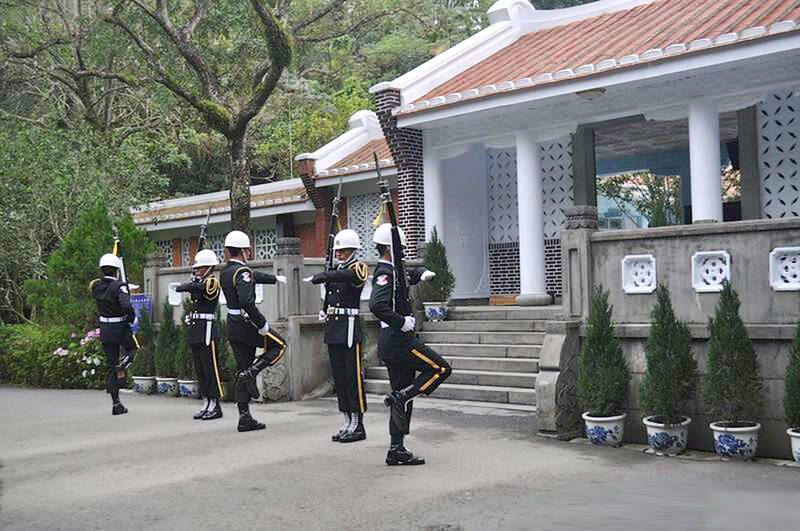The Ministry of National Defense has officially removed terms “to pay homage” and “mausoleum” in references to the final resting places of former presidents Chiang Kai-shek (蔣介石) and Chiang Ching-kuo (蔣經國) as part of transitional justice efforts.
The ministry on April 22 issued a notice changing the Armed Forces Reserve Command Taoyuan Division Management Regulations on Affairs of Paying Homage (國防部全民防衛動員署後備指揮部桃園管理組開放謁靈管理須知) to Armed Forces Reserve Command Taoyuan Division Management Regulations on Affairs of Paying Homage for the Cihu and Dasi Base (國防部全民防衛動員署後備指揮部慈湖營區暨大溪營區開放管理要點).
The Cihu (慈湖) and Dasi (大溪) areas are now referred to as bases and not “mausoleums,” and that applications to visit them, which used to include language of “paying homage,” have been changed to applications to visit the area where the sarcophagi of the two Chiangs are, the ministry said.

Photo: Taipei Times
The move was in response to Democratic Progressive Party Legislator Chiu Chih-wei (邱志偉) last month asking whether the government intended to remove the honor guards posted at Cihu and Dasi.
Chiu also asked whether the government intended to draft regulations regarding the usage of “to pay homage” and “mausoleum,” stating that the purpose of the military is to defend the nation, not to protect the graves of autocrats.
The word “mausoleum” carries imperial connotations, Chiu said, adding that the request of then-Taoyuan mayor Eric Chu (朱立倫) that the Ministry of National Defense dispatch honor guards to the sites on the grounds of stimulating tourism was a waste of taxpayers’ money.
Since his death on April 5, 1975, Chiang Kai-shek’s sarcophagus has been at Cihu and has not been interred, while the sarcophagus of his son Chiang Ching-kuo, who died on Jan. 13, 1988, is at Dasi.
The Presidential Office and the military at the time dispatched the military police to the areas to protect the areas and established the Taoyuan Management Division to oversee and maintain the sites.
The terms “to pay homage” and “mausoleum” in reference to the former presidents of the KMT regime have carried over into common parlance even after Taiwan became a democracy.

“China is preparing to invade Taiwan,” Deputy Minister of Foreign Affairs Francois Wu (吳志中) said in an exclusive interview with British media channel Sky News for a special report titled, “Is Taiwan ready for a Chinese invasion?” the Ministry of Foreign Affairs said today in a statement. The 25-minute-long special report by Helen Ann-Smith released yesterday saw Sky News travel to Penghu, Taoyuan and Taipei to discuss the possibility of a Chinese invasion and how Taiwan is preparing for an attack. The film observed emergency response drills, interviewed baseball fans at the Taipei Dome on their views of US President

The Central Weather Administration (CWA) today issued a "tsunami watch" alert after a magnitude 8.7 earthquake struck off the Kamchatka Peninsula in northeastern Russia earlier in the morning. The quake struck off the east coast of the Kamchatka Peninsula at 7:25am (Taiwan time) at a depth of about 19km, the CWA said, citing figures from the Pacific Tsunami Warning Center. The CWA's Seismological Center said preliminary assessments indicate that a tsunami could reach Taiwan's coastal areas by 1:18pm today. The CWA urged residents along the coast to stay alert and take necessary precautions as waves as high as 1m could hit the southeastern

ECONOMIC BENEFITS: The imports from Belize would replace those from Honduras, whose shrimp exports have dropped 67 percent since cutting ties in 2023 Maintaining ties with Taiwan has economic benefits, Ministry of Foreign Affairs officials said yesterday, citing the approval of frozen whiteleg shrimp imports from Belize by the Food and Drug Administration (FDA) as an example. The FDA on Wednesday approved the tariff-free imports from Belize after the whiteleg shrimp passed the Systematic Inspection of Imported Food, which would continue to boost mutual trade, the ministry said. Taiwan’s annual consumption of whiteleg shrimps stands at 30,000 tonnes, far exceeding domestic production, the ministry said. Taiwan used to fill the gap by importing shrimps from Honduras, but purchases slumped after Tegucigalpa severed diplomatic ties with Taiwan

The Executive Yuan yesterday approved a southwestern extension of the Sanying MRT Line from New Taipei to Bade District (八德) in Taoyuan, with a goal of starting construction by late 2026. The 4.03-kilometer extension, featuring three new stations, will run from the current terminus at Yingtao Fude Station (LB12) in New Taipei City to Dannan Station (LB14), where it will connect with Taoyuan’s Green Line, New Taipei City Metro Corp said in a statement. This extension will follow the completion of core Sanying Line, a 14.29-kilometer medium-capacity system linking Tucheng (土城), Sansia (三峽)